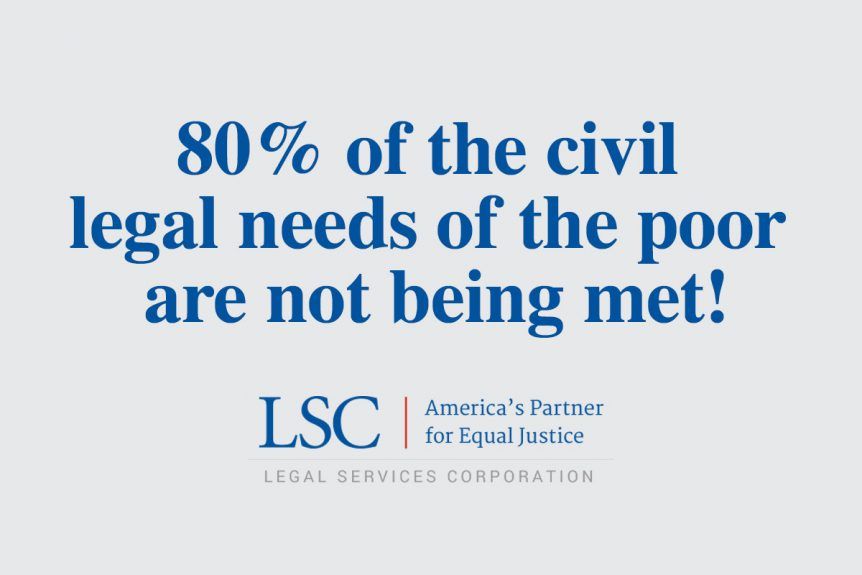EJA News
EJA News
Recent Posts
Archives
- December 2022
- August 2022
- March 2022
- October 2021
- September 2021
- July 2021
- May 2021
- October 2020
- July 2020
- April 2020
- August 2019
- February 2019
- December 2018
- November 2018
- October 2018
- August 2018
- July 2018
- June 2018
- April 2018
- December 2017
- October 2017
- September 2017
- March 2017
- July 2016
- December 2015
- September 2014
- March 2013
- October 2009
- September 2008
- June 2008
- March 2003

The Unmet Need for Legal Aid
Originally published by Legal Services Corporation. Click here to read the story on their site.
Nearly a million poor people who seek help for civil legal problems are turned away because of the lack of adequate resources. The justice gap represents the difference between the level of civil legal assistance available and the level that is necessary to meet the legal needs of low-income individuals and families. According to LSC’s 2009 report Documenting the Justice Gap in America, 50% of all those who sought legal assistance from LSC grantees were turned away because of the lack of adequate resources. That means for every client served by LSC programs, another person who seeks help is turned away.
State studies consistently show a higher percentage (80%) of the civil legal needs of the eligible population are not being met. Legal Services Corporation
State studies consistently show a higher percentage (80%) of the civil legal needs of the eligible population are not being met. A recent study by the Boston Bar Association found that in Massachusetts civil legal aid programs turn away 64% of eligible cases. Nearly 33,000 low-income residents in Massachusetts were denied the aid of a lawyer in life-essential matters involving eviction; foreclosure; and family law such as cases involving child abuse and domestic violence. People seeking assistance with family law cases were turned away 80% of the time.
New York’s recent findings confirm national data that less than 20% of all civil legal needs of low-income families and individuals are met. In 2013 more than 1.8 million litigants were not represented by counsel in civil proceedings in New York’s state courts.
In New York City:
- 91% of petitioners and 92% of respondents do not have lawyers in child support matters in family court.
- 99% of tenants are unrepresented in eviction proceedings.
In New York State:
- 87% of petitioners and 86% of respondents do not have lawyers in child support matters in family court.
- 91% of tenants are unrepresented in eviction proceedings.
Nationally, LSC grantees served nearly 1.9 million low-income persons in 2014. Millions more requested assistance but did not receive it because of the lack of adequate resources.
Originally published by Legal Services Corporation. Click here to read the story on their site.
Nearly a million poor people who seek help for civil legal problems are turned away because of the lack of adequate resources. The justice gap represents the difference between the level of civil legal assistance available and the level that is necessary to meet the legal needs of low-income individuals and families. According to LSC’s 2009 report Documenting the Justice Gap in America, 50% of all those who sought legal assistance from LSC grantees were turned away because of the lack of adequate resources. That means for every client served by LSC programs, another person who seeks help is turned away.
State studies consistently show a higher percentage (80%) of the civil legal needs of the eligible population are not being met. Legal Services Corporation
State studies consistently show a higher percentage (80%) of the civil legal needs of the eligible population are not being met. A recent study by the Boston Bar Association found that in Massachusetts civil legal aid programs turn away 64% of eligible cases. Nearly 33,000 low-income residents in Massachusetts were denied the aid of a lawyer in life-essential matters involving eviction; foreclosure; and family law such as cases involving child abuse and domestic violence. People seeking assistance with family law cases were turned away 80% of the time.
New York’s recent findings confirm national data that less than 20% of all civil legal needs of low-income families and individuals are met. In 2013 more than 1.8 million litigants were not represented by counsel in civil proceedings in New York’s state courts.
In New York City:
- 91% of petitioners and 92% of respondents do not have lawyers in child support matters in family court.
- 99% of tenants are unrepresented in eviction proceedings.
In New York State:
- 87% of petitioners and 86% of respondents do not have lawyers in child support matters in family court.
- 91% of tenants are unrepresented in eviction proceedings.
Nationally, LSC grantees served nearly 1.9 million low-income persons in 2014. Millions more requested assistance but did not receive it because of the lack of adequate resources.

